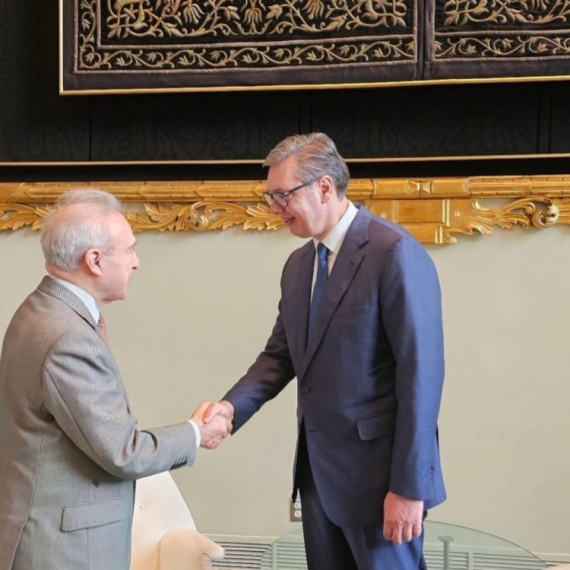SAA dominating election campaign
Tomorrow’s potential signing of the Stabilization and Association Agreement (SAA) has again dominated election campaigning today.
Monday, 28.04.2008.
16:15

Tomorrow’s potential signing of the Stabilization and Association Agreement (SAA) has again dominated election campaigning today. Democratic Party of Serbia (DSS) officials have called it illegal, or as Prime Minister Vojislav Kostunica put it, "an anti-state and anti-Constitutional act." SAA dominating election campaign President Boris Tadic says he does not want to speculate as to whether or not the agreement will be signed tomorrow, while Parliamentary Speaker Oliver Dulic confirmed to B92 that the EU could offer the agreement for signature during the meeting of EU foreign ministers in Luxembourg tomorrow. Dulic, a Democratic Party (DS) member, told B92’s Kaziprst program that the current Serbian government had brought the association process to its end, had authorized Djelic to sign the agreement, and that, in the meantime, not a single paragraph of the document had been altered, which meant that there was nothing to prevent signing. “Now, certain irresponsible people are trying to play around with the future of this country, and put this important process under a question mark for their own political ends or maybe out of personal or party interests,” said the speaker. “The process of European integration should be accelerated as fast as possible, and Serbia should be changed, modernized, normalized, and civilized enough for her to become an EU member,” he stressed, adding that the SAA was one of the most important steps in that regard. Asked by a journalist whether Serbia should sign the SAA tomorrow if it is offered, Dulic replied that “that is one of the things that might happen,” and that this would be good news for Serbia, as “we’ve lost a lot of time.” The SAA is primarily a trade agreement that offers a string of economic benefits to Serbia. The SAA is not “Solana’s agreement” and it certainly is not an agreement that recognizes Kosovo’s independence, underlined the speaker. The SAA is the first contractual document between Serbia and the EU in Serbia’s history, and refers primarily to commercial and economic relations between Serbia and the EU. The agreement would open EU borders for Serbian products, and Serbian borders for all EU products that Serbia does not currently manufacture, and would also set transitional periods for when EU products could be imported into Serbia duty-free, he explained. The agreement would allow the country’s rating to rise, and Serbia would become a very attractive country for foreign investors, and would allow it access to various funds, and create new jobs, economic security and a better future for all its citizens, Dulic added. The speaker added that Serbia needed to complete cooperation with the Hague Tribunal as soon as possible for the process of overall reconciliation in the region, out of respect to the victims’ families, and because of the eternal question of the last 15 years—“Who was to blame?”—and to “remove collective blame and responsibility.” He said there was no doubt as to who should sign that agreement. The government had brought the stabilization and association process to an end with the initialing of the SAA, and had authorized its deputy prime minister to sign it in its identical form when offered, explained Dulic. The speaker added that there was no reason why Djelic should no longer still be authorized to sign the agreement.
SAA dominating election campaign
President Boris Tadić says he does not want to speculate as to whether or not the agreement will be signed tomorrow, while Parliamentary Speaker Oliver Dulić confirmed to B92 that the EU could offer the agreement for signature during the meeting of EU foreign ministers in Luxembourg tomorrow.Dulić, a Democratic Party (DS) member, told B92’s Kažiprst program that the current Serbian government had brought the association process to its end, had authorized Đelić to sign the agreement, and that, in the meantime, not a single paragraph of the document had been altered, which meant that there was nothing to prevent signing.
“Now, certain irresponsible people are trying to play around with the future of this country, and put this important process under a question mark for their own political ends or maybe out of personal or party interests,” said the speaker.
“The process of European integration should be accelerated as fast as possible, and Serbia should be changed, modernized, normalized, and civilized enough for her to become an EU member,” he stressed, adding that the SAA was one of the most important steps in that regard.
Asked by a journalist whether Serbia should sign the SAA tomorrow if it is offered, Dulić replied that “that is one of the things that might happen,” and that this would be good news for Serbia, as “we’ve lost a lot of time.”
The SAA is primarily a trade agreement that offers a string of economic benefits to Serbia. The SAA is not “Solana’s agreement” and it certainly is not an agreement that recognizes Kosovo’s independence, underlined the speaker.
The SAA is the first contractual document between Serbia and the EU in Serbia’s history, and refers primarily to commercial and economic relations between Serbia and the EU. The agreement would open EU borders for Serbian products, and Serbian borders for all EU products that Serbia does not currently manufacture, and would also set transitional periods for when EU products could be imported into Serbia duty-free, he explained.
The agreement would allow the country’s rating to rise, and Serbia would become a very attractive country for foreign investors, and would allow it access to various funds, and create new jobs, economic security and a better future for all its citizens, Dulić added.
The speaker added that Serbia needed to complete cooperation with the Hague Tribunal as soon as possible for the process of overall reconciliation in the region, out of respect to the victims’ families, and because of the eternal question of the last 15 years—“Who was to blame?”—and to “remove collective blame and responsibility.”
He said there was no doubt as to who should sign that agreement.
The government had brought the stabilization and association process to an end with the initialing of the SAA, and had authorized its deputy prime minister to sign it in its identical form when offered, explained Dulić.
The speaker added that there was no reason why Đelić should no longer still be authorized to sign the agreement.




































Komentari 0